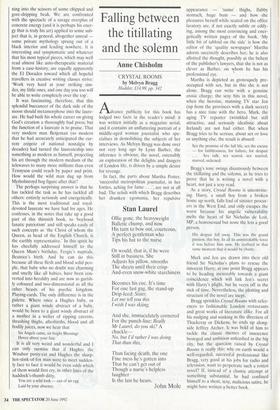Falling between the titillating and the solemn
Anne Chisholm
CRYSTAL ROOMS by Melvyn Bragg Hodder, £14.99, pp. 342 Advance publicity for this book has lodged two facts in the reader's mind: it was written initially as a magazine serial, and it contains an unflattering portrait of a middle-aged woman journalist who spe- cialises in demolishing the subjects of her interviews. As Melvyn Bragg was done over not very long ago by Lynn Barber, the inference is obvious; the novel, ostensibly an exploration of the delights and dangers of London life, is driven by a simple desire for revenge.
In fact, the parts about Martha Potter, 'successful metropolitan journalist, in her forties, aching for fame . . .', are not at all bad. The relish with which Bragg describes her drunken egomania, her repulsive appearance — 'sumo' thighs, flabby stomach, huge bum — and how she pleasures herself while seated on the office lavatory are, if not exactly subtle or edify- ing, among the most convincing and ener- getically written pages of the book. 'My little bit of tabloid on the side' is how the editor of the 'quality newspaper' Martha adorns succinctly describes her; he is also allotted the thought, possibly at the behest of the publisher's lawyers, that she is not as clever as Barber, on whom he has his professional eye.
Martha is depicted as grotesquely pre- occupied with sex, but in this she is not alone. Bragg can write with a genuine erotic charge; the sexy bits in this novel, when the heroine, stunning TV star Jen (up from the provinces with a dark secret) has a nice time with the hero, Mark, the aging TV reporter (wrinkled but still attractive, and seriously idealistic about Ireland) are not bad either. But when Bragg tries to be serious, about sex or love or anything else, the result is absurd:
Sex the promise of the full life, sex the excuse — for faithlessness, for failure, for despair ... Sex talk, sex scared, sex scarred, starved, sickened.
Bragg's tone swings disastrously between the titillating and the solemn, as he tries to prove that he is writing a novel with a heart, not just a sexy read.
As a story, Crystal Rooms is unconvinc- ing. Harry, a small boy from a broken home up north, falls foul of sinister procur- ers in the West End, and only escapes the worst because his angelic vulnerability melts the heart of Sir Nicholas de Loit, MP, a homosexual but none the less a good person.
His despair fell away. This was the grand passion, this boy. In all its unmistakable force it was before him now. lie realised in that same moment that it would be chaste ...
Mark and Jen are drawn into their old friend Sir Nicholas's plans to rescue the innocent Harry; at one point Bragg appears to be heading inexorably towards a giant coincidence which will link Jen's secret with Harry's plight, but he veers off in the nick of time. Nevertheless, the plotting and structure of the novel are inept.
Bragg sprinkleseGysta/ Rooms with refer- ences to fashionable London restaurants and great works of literature alike. For all his nudging and winking in the direction of Thackeray or Dickens, he ends up along- side Jeffrey Archer. It was bold of him to tackle the classic themes of innocence besieged and ambition unleashed in the big city, but the question raised by Ctystal Rooms is really this: why on earth would a well-regarded, successful professional like Bragg, very good at his jobs for radio and television, want to perpetrate such a rotten novel? If, instead of a clumsy attempt at something substantial, he had confined himself to a short, sexy, malicious satire, he might have written a better book.


























































 Previous page
Previous page